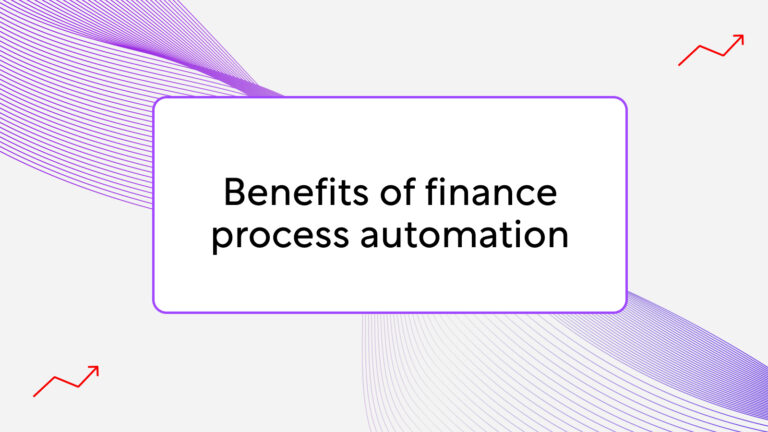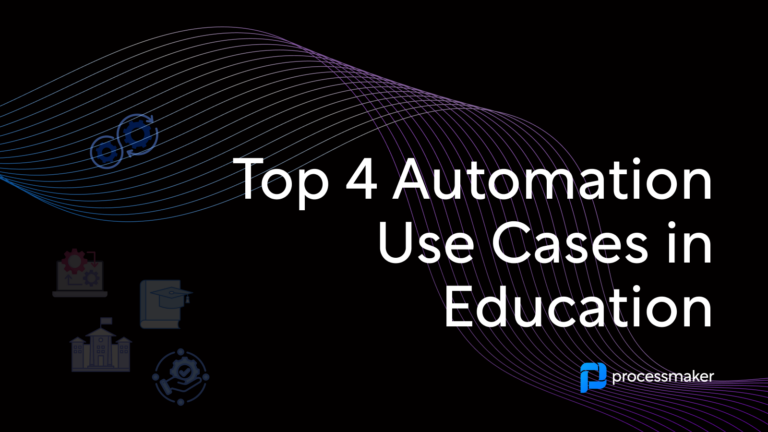Imagine a month-end for the finance team when everything goes according to plan and automation takes care of the most repetitive, manual work. No urgent Slack notifications, no stress, just smooth processes.
In most businesses, month-end is not like this. Finance teams frequently find themselves overwhelmed by rising expectations coupled with inefficient workflows, tools, and processes. Recent research by ProcessMaker found an average employee in a finance department performs over 1000 copy-pastes a week and spends 50% of their time on repetitive tasks.
In response to this challenge comes finance process automation, enabling businesses to automate financial processes and improve efficiency. This article will outline essential insights for finance leaders, covering the benefits, opportunities, and challenges associated with automating financial processes.
What is business process automation?
Process automation is the use of technology to automate repetitive or manual tasks to increase efficiency and save time. In the finance function, automated financial processes lead to streamlined operations, cost savings, and better decision-making.
In simple terms, finance process automation is all about eliminating wasted work in your finance processes, but what’s wrong with finance processes in the first place?
Some of the consistently recognized challenges include:
- Inefficient processes. Many finance tasks are still performed manually, which leads to huge sunken costs and difficulties in maintaining efficient processes.
- Too much repetitive work. Finance operations still include many repetitive tasks and processes. Finance teams waste approximately 10% of their time in swivel chair processes logging in and copying information from one system to another.
- Slow approvals. Many financial processes depend on manual interventions, such as manager approvals, which leads to challenges with throughput time and meeting deadlines.
- Unreliable data and reporting. Many financial reports still rely on spreadsheets that aggregate data from various source systems, leading to inconsistencies and inaccuracies.
Benefits of finance process automation
Automation offers numerous benefits to businesses and individuals in managing their financial activities. Selecting the right automation solutions is crucial for maximizing these benefits and ensuring seamless integration with existing systems. Here are some of the main reasons why automation is essential in finance:
1. Improve speed and efficiency.
Automation significantly streamlines various finance processes by enabling tasks to be completed faster and with less manual intervention. For example, automated invoicing systems can generate and send invoices in seconds, as opposed to hours spent manually creating and mailing them. This not only reduces the time and effort required but also allows finance teams to focus on more strategic initiatives. By reallocating saved time and resources, businesses can improve their operational efficiency, ensuring that they are agile and responsive to market demands.
2. Enhance accuracy and detail
Automation plays a crucial role in minimizing human error in financial tasks. For instance, when using automated software for data entry, the system can cross-verify information from multiple sources, significantly decreasing the chances of mistakes that could arise from manual entry. Additionally, automated financial reporting tools can generate real-time reports with high levels of accuracy, thus providing decision-makers with reliable data. This improved accuracy not only enhances data quality but also fosters trust in financial reporting, which is essential for effective strategic planning.
3. Reduce costs.
Automating repetitive, manual tasks can lead to substantial cost savings for businesses. For example, by implementing automated payroll systems, companies can significantly decrease the amount of time spent on payroll processing, which traditionally requires extensive hours and staff involvement. Furthermore, automation minimizes the risk of costly mistakes, such as incorrect payroll calculations or misfiled tax documents, which can lead to penalties and additional expenses. This dual benefit of reducing labor costs while also mitigating the potential for financial errors contributes to a healthier bottom line.
4. Quick to scale.
One of the significant advantages of automated systems is their ability to handle increased workloads seamlessly as businesses expand. For instance, a company experiencing rapid growth may suddenly face a higher volume of transactions. Manual processes would struggle to keep up, leading to delays and potential errors. However, automated financial systems can effortlessly scale to accommodate this increase in demand, allowing for smooth operations without the need to hire additional staff. This scalability enables businesses to focus on growth and expansion without the common growing pains associated with finance operations.
5. Save time.
By automating routine financial tasks, businesses not only save time but also empower their finance teams to engage in more strategic activities. For example, rather than spending hours on reconciliations or data entry, finance professionals can dedicate their efforts to analyzing financial trends, forecasting future performance, or developing strategies for risk management. This shift from administrative work to higher-level strategic planning fosters innovation and allows companies to maintain a competitive edge in the market by being proactive rather than reactive.
What are the key finance processes you can automate?
As a rule of thumb, any finance process that requires manual and repetitive work can be automated. Finance automation tools play a critical role in automating these processes, ensuring efficiency and accuracy. Notable examples include AP, AR, reconciliations, expense approvals, payroll, financial forecasting and reporting.
Here are some of the key finance processes that can be automated:
Accounts payable and receivable
Automating accounts payable and receivable processes can streamline payment processing, reduce errors, and improve cash flow management. Tasks that can be automated include:
- Invoice processing and approval: Automation tools can handle the entire invoice lifecycle, from receipt to approval, ensuring timely and accurate processing.
- Payment processing and reconciliation: Automated systems can manage payments and reconcile accounts, reducing manual intervention and minimizing errors.
- Credit management and invoicing: Automation can streamline credit management and invoicing, ensuring timely billing and improving cash flow.
- Cash flow forecasting and management: Automated tools can provide real-time insights into cash flow, helping businesses make informed financial decisions.
Payroll processing
Automating payroll processing can reduce errors, improve compliance, and increase efficiency. Tasks that can be automated include:
- Payroll calculation and processing: Automation ensures accurate and timely payroll calculations, reducing the risk of errors.
- Tax compliance and reporting: Automated systems can handle tax calculations and reporting, ensuring compliance with local regulations.
- Benefits administration and management: Automation can streamline the management of employee benefits, from enrollment to administration.
- Time-off management and tracking: Automated tools can track employee time-off requests and approvals, ensuring accurate record-keeping.
Financial reporting and analysis
Automating financial reporting and analysis can provide real-time insights into financial performance, improve decision-making, and reduce errors. Tasks that can be automated include:
- Financial statement preparation and analysis: Automation tools can generate financial statements and perform detailed analysis, saving time and improving accuracy.
- Budgeting and forecasting: Automated systems can create budgets and forecasts based on historical data, providing more accurate and reliable projections.
- Variance analysis and reporting: Automation can streamline variance analysis and reporting, helping businesses identify and address discrepancies quickly.
- Financial modeling and simulation: Automated tools can perform complex financial modeling and simulations, providing valuable insights for strategic planning.
Automating key finance processes can significantly improve efficiency, accuracy, and cost-effectiveness for businesses. By leveraging automation tools and technologies, companies can free up their finance teams to focus on more strategic tasks, ultimately leading to better financial performance and growth.
Preparing for finance automation
Preparing for finance automation involves several steps that can help ensure a successful implementation. Here are some key considerations:
Assessing current processes
Assessing current financial processes is essential to identify areas that can be automated, streamlined, or improved. This involves:
- Mapping current financial processes and workflows. Documenting existing processes helps identify inefficiencies and areas for improvement.
- Identifying manual tasks and bottlenecks. Pinpointing repetitive and time-consuming tasks can highlight opportunities for automation.
- Evaluating existing financial systems and software. Assessing current systems helps determine if they can support automation or if new solutions are needed.
- Determining the need for new financial processes or workflows. Identifying gaps in current processes can help design more efficient workflows.
By assessing current financial processes, organizations can identify opportunities for automation, improve efficiency, and reduce errors. This is an essential step in preparing for finance automation and ensuring a successful implementation.
Map your automation opportunities with process intelligence
With modern tools like process intelligence, assessing current processes can be done fully automatically without any need for manual documentation of the processes. Typically enterprise business customers uncover ~20% savings within 30 days of plug-and-play installation of ProcessMaker process intelligence.
Process automation is the key to streamlined processes
To make financial processes more efficient and streamlined, companies are increasingly using business process automation tools to optimize workflows and reduce manual work. ProcessMaker is an industry leader in low-code process automation and can take your processes to new operational heights. Discuss with our experts how you can use process automation for your finance department.
Q&A:
Why is automation needed in finance?
Automation is needed in finance to improve efficiency, accuracy, and cost-effectiveness. By automating repetitive, manual tasks, financial institutions can streamline their operations, reduce human error, and allow employees to focus on more strategic, value-added activities. This ultimately leads to better decision-making, increased productivity, and enhanced competitiveness in a rapidly evolving market landscape.
What is process automation in the finance function?
Process automation in the finance function refers to the implementation of software and technology to automate routine, manual tasks within the financial domain. This can include processes such as data entry, account reconciliation, invoice processing, and financial reporting. By automating these tasks, financial institutions can minimize errors, save time, and optimize resource allocation, leading to better overall performance and strategic insights.
How can robotic process automation help finance?
Robotic Process Automation (RPA) can help finance by automating repetitive tasks, increasing accuracy, and reducing operational costs. RPA uses software robots to mimic human actions, executing tasks across multiple systems and applications. This enables finance teams to reallocate their time and resources to more strategic and analytical tasks, enhancing decision-making capabilities and enabling more agile responses to market fluctuations and regulatory changes.
Is there an alternative for RPA?
If you’re looking for a solution that goes beyond automating individual tasks and streamlines end-to-end workflows and even the most complex processes, then ProcessMaker process automation could be the answer for you.





